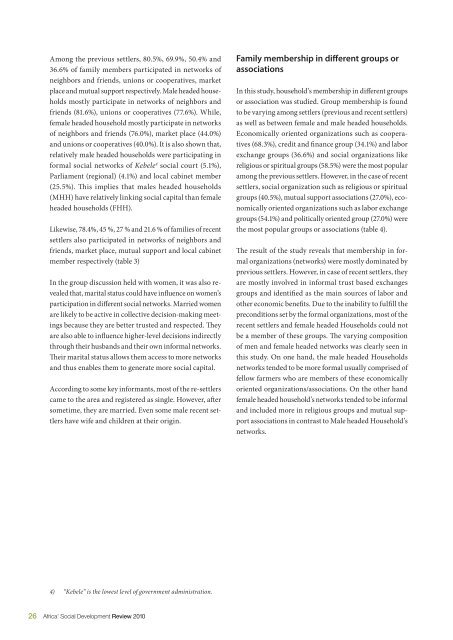The African Social Development Review - United Nations Economic ...
The African Social Development Review - United Nations Economic ...
The African Social Development Review - United Nations Economic ...
You also want an ePaper? Increase the reach of your titles
YUMPU automatically turns print PDFs into web optimized ePapers that Google loves.
Among the previous settlers, 80.5%, 69.9%, 50.4% and36.6% of family members participated in networks ofneighbors and friends, unions or cooperatives, marketplace and mutual support respectively. Male headed householdsmostly participate in networks of neighbors andfriends (81.6%), unions or cooperatives (77.6%). While,female headed household mostly participate in networksof neighbors and friends (76.0%), market place (44.0%)and unions or cooperatives (40.0%). It is also shown that,relatively male headed households were participating informal social networks of Kebele 4 social court (5.1%),Parliament (regional) (4.1%) and local cabinet member(25.5%). This implies that males headed households(MHH) have relatively linking social capital than femaleheaded households (FHH).Likewise, 78.4%, 45 %, 27 % and 21.6 % of families of recentsettlers also participated in networks of neighbors andfriends, market place, mutual support and local cabinetmember respectively (table 3)In the group discussion held with women, it was also revealedthat, marital status could have influence on women’sparticipation in different social networks. Married womenare likely to be active in collective decision-making meetingsbecause they are better trusted and respected. <strong>The</strong>yare also able to influence higher-level decisions indirectlythrough their husbands and their own informal networks.<strong>The</strong>ir marital status allows them access to more networksand thus enables them to generate more social capital.According to some key informants, most of the re-settlerscame to the area and registered as single. However, aftersometime, they are married. Even some male recent settlershave wife and children at their origin.Family membership in different groups orassociationsIn this study, household’s membership in different groupsor association was studied. Group membership is foundto be varying among settlers (previous and recent settlers)as well as between female and male headed households.<strong>Economic</strong>ally oriented organizations such as cooperatives(68.3%), credit and finance group (34.1%) and laborexchange groups (36.6%) and social organizations likereligious or spiritual groups (58.5%) were the most popularamong the previous settlers. However, in the case of recentsettlers, social organization such as religious or spiritualgroups (40.5%), mutual support associations (27.0%), economicallyoriented organizations such as labor exchangegroups (54.1%) and politically oriented group (27.0%) werethe most popular groups or associations (table 4).<strong>The</strong> result of the study reveals that membership in formalorganizations (networks) were mostly dominated byprevious settlers. However, in case of recent settlers, theyare mostly involved in informal trust based exchangesgroups and identified as the main sources of labor andother economic benefits. Due to the inability to fulfill thepreconditions set by the formal organizations, most of therecent settlers and female headed Households could notbe a member of these groups. <strong>The</strong> varying compositionof men and female headed networks was clearly seen inthis study. On one hand, the male headed Householdsnetworks tended to be more formal usually comprised offellow farmers who are members of these economicallyoriented organizations/associations. On the other handfemale headed household’s networks tended to be informaland included more in religious groups and mutual supportassociations in contrast to Male headed Household’snetworks.4) “Kebele” is the lowest level of government administration.26 Africa’ <strong>Social</strong> <strong>Development</strong> <strong>Review</strong> 2010
















